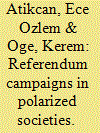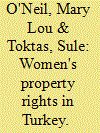| Srl | Item |
| 1 |
ID:
121468


|
|
|
|
|
| Publication |
2013.
|
| Summary/Abstract |
From Abdül-Hamid's regime and onward, cartoons have been a powerful influential gauge and have played an important role in the political arena in Turkey. The purpose of this essay is to express continuity in the way Turkish politicians have reacted to cartoons throughout the years. This essay argues that cartoons create a change in public opinion and are thus perceived as a threat to the regime, which therefore wishes to eliminate or minimize the cartoon's power. This essay will discuss the similarities and distinctions of regime responses in Turkey, introduce the history and the conception of cartoons in Ottoman Empire-Turkey and will dedicate a prominent part to the Erdogan's attitude to cartoons and its impact on Turkish society.
|
|
|
|
|
|
|
|
|
|
|
|
|
|
|
|
| 2 |
ID:
137424


|
|
|
|
|
| Summary/Abstract |
This paper examines the attempt by the Turkish underground journal Şizofrengi (1992–98) to provide a space for psychiatrists, artists, and mental patients to voice their personal concerns as a means to critique problems in Turkish society. Şizofrengi was founded by young psychiatrists in order to critique the problems they felt were endemic to their field. Rejecting the institutional practices and assumptions the editors found constraining in their psychiatric community, Şizofrengi sought to give the patient a space to speak for themselves in order to deconstruct the vaunted role of the psychiatrist in Turkey. But Şizofrengi also sought to appropriate the language of psychology and the “madnesses” of the patients it strives to cure in order to revitalize what the editors felt was a moribund literary culture. The journal gave a voice to marginalized, underground writers, critics, and film makers that would go on to become far better known outside the confines of the journals’ pages. While the result demonstrates that care must be taken when borrowing the discourse of the mentally ill, Şizofrengi presents an interesting case of a journal that was able to draw on issues of psychiatry in order to critique both literary and mainstream society.
|
|
|
|
|
|
|
|
|
|
|
|
|
|
|
|
| 3 |
ID:
116408


|
|
|
|
|
| Publication |
2012.
|
| Summary/Abstract |
Can referendum mechanism be used in deeply polarized societies without invoking existing cleavages? This question is tackled by studying two recent Turkish constitutional referenda, which took place in 2007 and 2010. Turkish society and politics are highly polarized along the secular versus pro-Islam axis. Based on an in-depth study of the campaign materials, media content analysis, and survey data from both cases, it is demonstrated that although both referendum proposals were related to secularism in Turkey, this cleavage was more visible in the 2010 vote. If political parties choose to treat referenda as elections, voters' predispositions are more likely to be reinforced, and partisan voting is more likely to prevail. This research shows that controlled comparisons help in understanding the role of party politics in direct democracy.
|
|
|
|
|
|
|
|
|
|
|
|
|
|
|
|
| 4 |
ID:
142297


|
|
|
|
|
| Summary/Abstract |
While various studies suggest that anti-Semitism is almost non-existent in Turkish society, the popularity of the conspiratorial rhetoric about Jews raises question marks about this view. This article probes into contemporary anti-Semitism in Turkey by scrutinizing conspiracy theories about a crypto-Judaic society called Dönme. It explores the influence of the paranoid style in Turkish politics, known as the Sèvres syndrome, on the popular conspiracy theories with anti-Semitic themes. The research relies on an analysis of the content of conspiracy accounts and interviews with their authors. It concludes that the influence of the Sèvres syndrome is imperative to understand the rationale of anti-Semitic conspiracy rhetoric in Turkey.
|
|
|
|
|
|
|
|
|
|
|
|
|
|
|
|
| 5 |
ID:
129557


|
|
|
|
|
| Publication |
2014.
|
| Summary/Abstract |
This article takes Turkey as a case study, exploring marital and inheritance regimes with regard to their impact on women and their ability to protect women's property rights. The aim of the study is to bring to light the workings of the legal system that regulate the acquisition of property and to scrutinize the gap between the law and its practice in Turkish society. By taking this approach, the article does not only focus on laws but also on how these laws are adopted by society. Thus, two levels of analysis-de jure and de facto-are utilized for an investigation of women's property rights and hence their social and economic status.
|
|
|
|
|
|
|
|
|
|
|
|
|
|
|
|